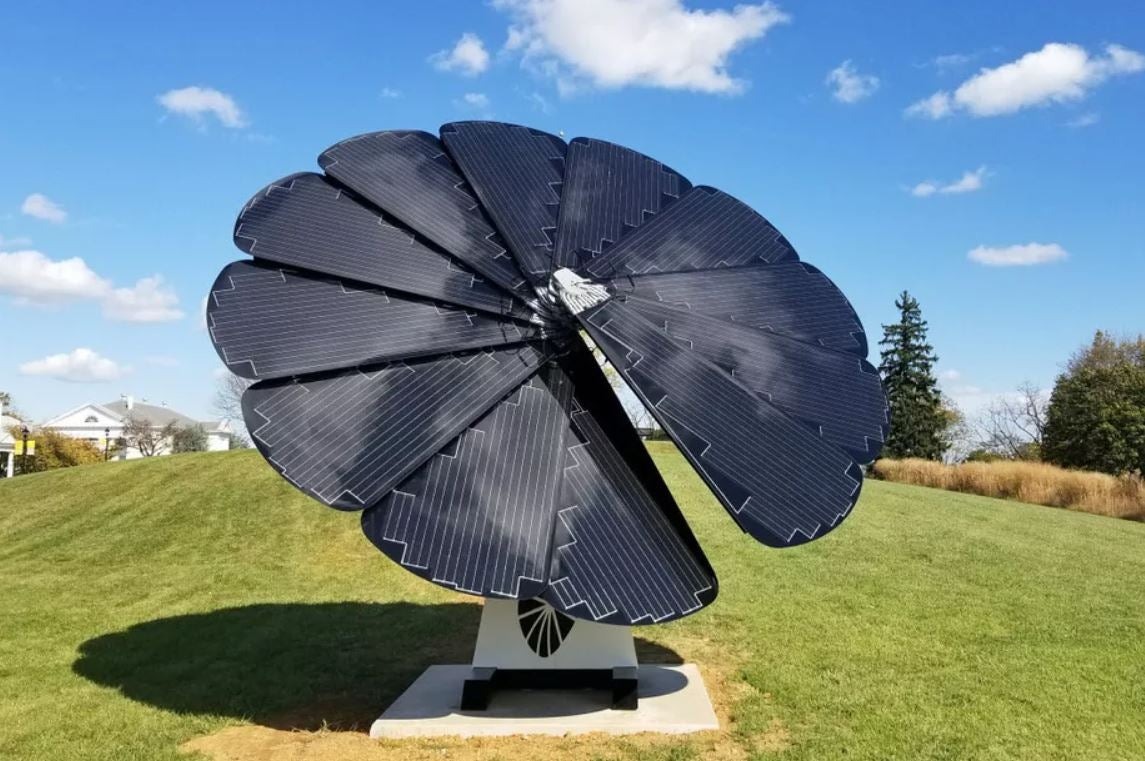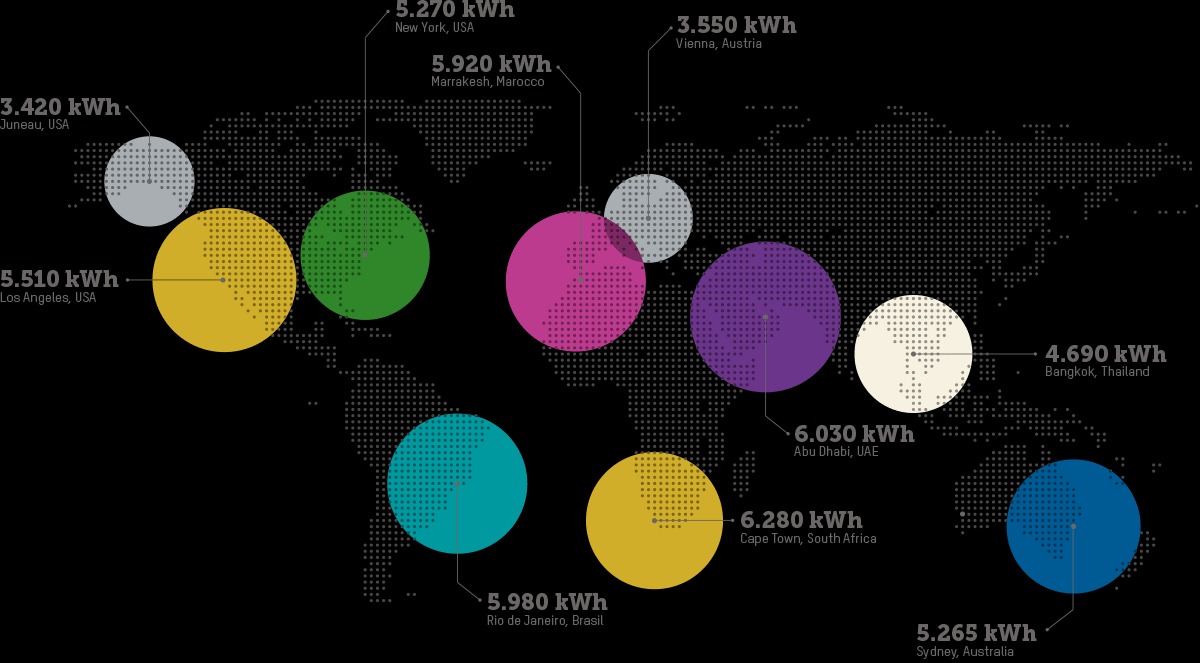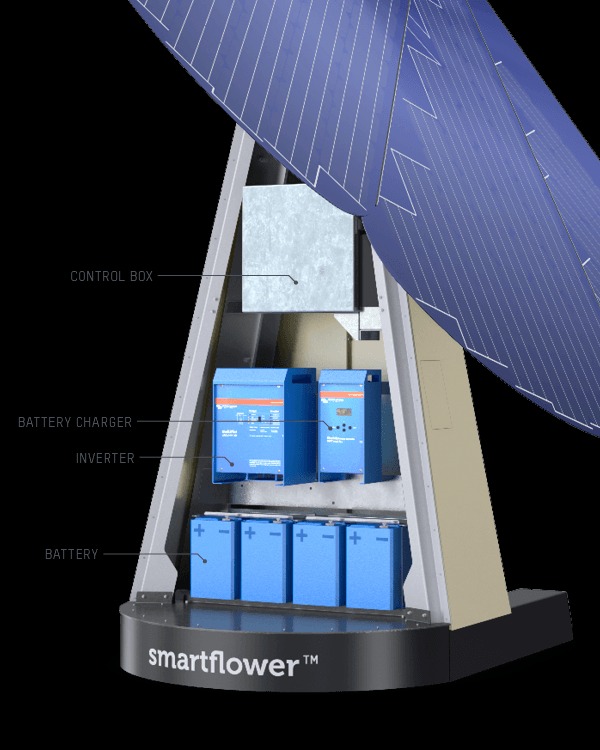Updated 11 months ago
Smartflower Solar Tracker: A Change for Residential Solar?
Written by
Alex Sendy

Find out what solar panels cost in your area
What is the Smartflower solar system?
The Smartflower is a fusion between solar panels and art. It follows the theme that started with the Tesla solar roof launch, which is making more aesthetically pleasing solar panels.
Much like a real flower, the system unfolds its petal panels when the sun rises. The Smartflower then directs its petals toward the sun at a 90-degree angle and almost immediately begins to produce renewable energy. This is why the Smartflower is also referred to as the “solar flower”.
Thanks to the dual-axis tracking system, the flower reliably tracks the sun throughout the day - producing upwards of 40 percent more clean energy than traditional solar panels.
At sunset, the petals automatically retract until the next morning. The Smartflower will also automatically retract the petals in high winds in excess of 30 miles per hour. In fact, the unit is capable of withstanding hurricane-force winds.
How big is a Smartflower solar array?
When the petals are fully extended, the Smartflower is about 16 feet in diameter. The entire structure is about 200 square feet - about the size of a small one-car garage.

Key features of the Smartflower system
The system’s exceptional elevated design enables the solar panels to cool naturally; air passes behind each “petal” in order to provide natural cooling. This leads to an increase in each panel's overall productivity by up to 10 percent.
The Smartflower automatically self-cleans each panel every time it opens or closes. Long brushes attached to the underside of each petal's outer edge sweep the panel beneath it when in movement. This smart feature can also improve production by up to 2 percent.
The system itself is a large solar tracker, following the movement of the sun to increase energy production.
Installation process for the Smartflower solar unit
In order for warranties to apply and to ensure proper installation, a Smartflower Solar™ certified technician should install each unit, despite being fully assembled before delivery, as placement of the system may require using a large forklift or crane.
Additionally, connecting the unit to your home's electrical distribution system requires the skills of a licensed electrician. It’s likely you will have to dig a trench from your Smartflower to your home to run wires.
It is possible that you’ll need to attach your Smartflower to a concrete slab or ground screw system for support. These are things you don't have to worry about when installing fixed solar panels on a roof. Initial programming also requires the skills of a certified technician.
Your authorized Smartflower dealer will be able to research and obtain any permits necessary to meet any setbacks and other requirements.
Here’s a great video showing the full installation of the smart flower:
How much does the Smartflower cost compared to regular solar panels?
Cost per watt is the best way to compare pricing between different solar systems. The Smartflower costs between $25,000 to $30,000, with the average cost being approximately $27,000.
This is around $10 per watt, or $10,000 per kilowatt. Bear in mind, because the Smartflower solar system tracks the sun, its 2.5 kW of solar cells has a similar level of output as 4 kW of a fixed-mounted solar panel system. This brings the number down to an effective $6.50 per watt, or $6,500 per kilowatt.
After deducting the 30% solar tax credit, the average price of a Smartflower comes down to about $18,900. Assuming their 2.5 kW unit produces the same as 4 kW of a conventional solar PV system, the price is effectively $4.73 per watt.
By comparison, a conventional 4kW rooftop solar energy system costs about $10,000 after incentives or $2.25 per kilowatt. That’s about half the cost of the Smartflower system.
Both types of solar panel installation offer 25-year warranties.
Is the Smartflower worth it?
When asking this question, it depends on what type of person you are and what you could be looking to achieve by installing a Smartflower system.
This piece of technology is a conversation piece. It’s also a work of art. If you’re a budget-minded, practical consumer, the Smartflower doesn’t make a lot of sense.
However, if you have a sizable chunk of disposable income, are looking to grab some attention, and want to inspire people to take action while tastefully adding to your property’s aesthetics, then absolutely, the Smartflower is worthy of your consideration.
How much electricity does each Smartflower unit produce?
A Smartflower typically produces between 3,400 and 6,200 kilowatt-hours (kWh) annually, depending on its location.
Sunny climates will produce more electricity than climates receiving less sunlight. On average, a Smartflower system delivers about 4,000 kWh annually, which is about half of the average American home’s annual electricity consumption.
What is the Smartflower’s energy production compared to conventional solar panels?
Like a rooftop solar system, the amount of solar power produced each year depends on the location and roof direction. Smartflower published an output expectancy map on their website showing the amount of power you can expect to get out of their 2.5 kW array.

With 5,510 kWh per year in Los Angeles, the Solarflower rivals the output of a 4kW rooftop solar panel system.
How much money can I save with the Smartflower system?
While you can get more solar installed for less with a traditional photovoltaic system, the Smartflower can still save you a ton of money over the next 25 years.
With 5,510 kWh of electricity produced per year in Los Angeles, the Solarflower rivals the output of a 4 kW rooftop solar panel system. At an average cost of electricity of $.20/kWh, that amounts to annual savings of over $10,000.
What is the Smartflower Plus?
The Smartflower Plus is the same system with a solar-powered integrated battery and inverter that can be used to run either a hybrid system or a complete standalone off-grid solar system.
The Smartflower Plus comes in two versions, which offer either 4.6 kWh or 13.8 kWh of energy storage, with the larger size being very similar in terms of energy storage to the Tesla Powerwall.
Although the system is comparatively expensive, I am confident that it will work. They have chosen to incorporate good electronics and I'm excited about the product.

Can I charge my electric vehicle with the solar Smartflower?
Yes, you can use the energy produced from your smartflower to charge your electric vehicle. Smartflower has also announced a new product called the Smartflower EV, which is a conventional Smartflower with a plug-in port for your EV.
Final thoughts on the Smartflower system
Aesthetically, the Smartflower is a stunning, portable, and innovative technology. The system is available in eight different colors and can be installed in under an hour. If homeowners eventually move, they can simply take the system with them.
The Smartflower can also be a great option if you aren’t concerned with meeting 100% of your home's electrical needs.
Like all large purchases, compare multiple quotes from solar installers before making any decision. With its extraordinary construction and flawlessly synchronized components, Smartflower just might be fueling the winds of change for the solar industry.
Alex Sendy is a content writer and valued team member at SolarReviews. As the son of a solar company owner, Alex since a young age has had a strong appreciation for the environment and renewable energy. When he's not at SolarReviews you can find him playing soccer or homebrewing....
Learn more about Alex Sendy